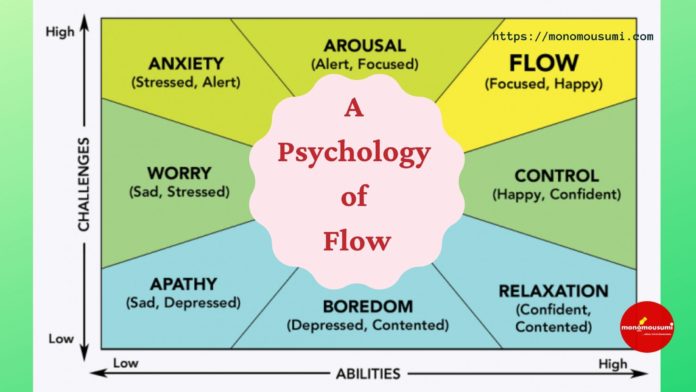Have you ever entered a state where you had been so focused on the work at hand that you felt oblivious of the things around you? Or have you ever desired to be in such a state of trance where nothing mattered more than the task in hand? Psychologists say that such a deep sense of involvement in something not only enhances our productivity but also increases the dopamine levels in our bodies. Such experiences involving single-minded focus helps to achieve better mental health and lead to increased happiness, along with a higher sense of achievement. Psychologists call this state “flow”, a state of mind where you feel a sense of complete control over your actions and the outcomes. This subjective state of mind reflects the optimal experience during an activity when factors like boredom and fatigue fail to subdue the body.
What makes flow all the more important for our current times is the deluge of distractions that we find ourselves surrounded in. Concentrating on one activity at a time is becoming more of an extraordinary skill in this world that glorifies multitasking. Moreover, let’s not forget the mental stress that the lockdown paradigm places on us during the ongoing COVID-19 era. This necessitates us to consider mindfulness seriously. And it’s not rocket science. The attainment of flow is all about making positive changes to our lifestyle and adopting a few practices that help us have the optimal experience in any activity.
Constituents of Flow
People often wonder how to attain flow in their daily life. Our schools and society often don’t teach the very fundamentals of attaining happiness. This leaves people with a distorted perspective of happiness and they tend to find it in amassing wealth or in hedonic consumption. Eventually, they end up being trapped in the endless and cheerless desire for more. Whereas, mindfulness for flow is easy to attain with some basic changes to one’s lifestyle.
Challenge Competence Equilibrium: Flow requires us to work on activities that are neither too difficult to work on, nor too easy to complete. A highly difficult assignment can dishearten us, while extremely easy tasks may not give us the required satisfaction. It is only when we do activities that are a little higher in complexity than our current competence, that we attain flow. If you have ever been a fan of video games, you will realize how video game developers use this principle to dare us on challenges that are just above our skill level. When we beat a challenge, we end up improving our skills and feel like an achiever. This process releases dopamine – the achievement hormone, that adds to our mental wellness.
Clear objectives and feedback: Only when the objectives are clear and a positive feedback loop is in place, can we think of achieving flow. This is why sportspersons easily achieve flow during their games, since the objective of winning is clear in their mind, and the scores keep providing regular feedback to them. As a result, their awareness gets merged with their actions and this leads to mindfulness in their sport.
Transcendence of time: People experiencing flow often lose track of time. They grow so engrossed in an activity that the sense of the ordinary passage of time gets perceptibly distorted. In a state of flow, people feel as if time has sped up or has become completely irrelevant. A beautiful example of the same can be taken from our childhood. When we used to play in the playground with friends, we often lost the sense of time and did not realize how the minutes and hours passed so fast. Undoubtedly, time had been running at its course; however, the absorption of one’s mind in the various activities used to overpower our sense of time.
Health benefits of Flow
Flow is all about mindfulness. It is a state of losing oneself in the moment when all the abilities of the body are in alignment with the activity. The experience becomes so joyful that people participate in it just for the sheer sake of doing it. Such experiences are common while playing video games, or while taking a hot shower after some workout, or even during reading a novel that captures our imagination. The world around us grows quieter and the entire body and soul get focused on achieving something that might have seemed impossible earlier.
Losing oneself to a specific purpose has therapeutic effects on the mind and body. There are several benefits of attaining flow in work. From improving personal health to attracting the best outcomes, a state of flow is crucial for turning every activity into a success story.
Decreased rumination: A study by Chambers et al. in 2008 revealed that people who practice mindfulness report higher satisfaction with their work and benefit from decreased negative health impacts. On the contrary, people who give in to the distractions often end up brooding over their inefficiency and stress out because of the scattered work. Stress, as we all know, is a huge detriment for our health and it slowly chips away our physical well-being too. Practicing mindfulness as a part of lifestyle helps to maintain good mental and physical health.
Less anxiety: Attaining flow in any activity helps people to disengage from factors causing emotional strain while helping in focusing better on the cognitive tasks. Mindfulness helps to lower anxiety levels and fight somatic distress, through which people can selectively experience emotions that they want. High anxiety is a major contributing factor behind cardiovascular ailments, immune deficiency, and respiratory issues. By practicing mindfulness, people can ward off these ailments and can benefit from the increased unwavering focus, which also increases the probability of the desired outcomes.
Stress alleviation: Mindfulness and the consequent state of flow are effective in beating stress and in cognitive therapy. Multiple clinical issues that are born out of cognitive and affective processes can be addressed using mindfulness-based therapy.
Happier relationships: One can undoubtedly say that mindfulness leads to happier relationships with friends and family members. When we grow happy with ourselves, we tend to send out positive vibes around us, which impact our surroundings. According to the Law of Attraction, people experiencing flow are generally happier, and therefore, they attract the joyful elements of the universe around them. When we keep stress and anxiety at bay, the relationship goals and the circumstances of the other people become clear. This helps us to empathize with other people, analyze a situation better without judgments and find out a solution amid the chaos of conflicts. Especially, in these times of the pandemic, we all end up juggling multiple hats every day as we shuttle between office work, household chores and some private leisure time. Mindfulness helps us to concentrate on one task at a time and helps us complete them before deadlines, so that life can be balanced between the different responsibilities.
Steps to attain flow
In case you are wondering if you can attain flow in your daily life, the answer is a resounding “Yes”. It is easy to enter a flow-like state of mind, provided you have made a few changes to your lifestyle. It takes a bit of practice at first, but eventually, life falls into a happy place. You deserve much more happin
Do what you love: Yes, that is the mantra that the motivational speakers have been sharing with us for so long. Mindfulness needs us to do the work that we love. Unless we don’t do something out of our passion and interest, we are bound to give in to distractions. Having a single-minded focus on an activity requires that you fall in love with what you do.
Keep the challenge manageable: Any task that does not challenge us to achieve a higher goal is not good enough to help you attain flow. This requires the challenge to be just above our competence level. Therefore, involve yourself in activities that help you make incremental growth to your capabilities, while not disheartening you with failed outcomes.
Stay clear of distractions: Flow requires minimum distractions to exist around you. You can find a quaint place to work, where you won’t be disturbed by the outside world. The digital devices and the social media platforms must not keep beeping to seek your attention. Some people prefer working on important assignments during the early mornings and late nights when the world around them in its tranquil best.
Reward yourself: Recognizing the outcomes of mindfulness is important. You can maintain a journal where you can list down all the activities that are planned for the next day. Once all the activities get completed, you can reward yourself with little prizes, like a pack of chocolate or some time off for playing a digital game. This will encourage you further to focus on mindfulness and will also bring in discipline in life.
No to multitasking: Mindfulness requires that you focus on only one task at a time. Therefore, you must start an activity and continue with it until its closure. It is when we try to juggle different things at the same time, that we fall into frustration and end up not completing any work with quality. Multitaskers are not always the best at ensuring good quality of outcomes, however, mindful people certainly are.
Positive anchor statements: Some people may call it self-praise or an act of delusion. However, it indeed helps to look at oneself in the mirror and say positive words to oneself. Statements like “I can do it” or “This too shall pass” helps to uplift our emotions. An anchor statement provides affirmation to interrupt a series of negative thoughts with a strong positive thought. It can anchor you back to the current moment and takes away the fear of the uncertain future. Such statements have a positive effect on psychology, as it reminds us that we hold the power to determine the outcomes of your life.
The ultimate technique of maintaining good health and a balanced lifestyle is to practice mindfulness for attaining flow. Health and lifestyle are crucial aspects of our life, and the buck stops at us. Multitasking is not as a great concept as it was once deemed to be. Mindfulness is the order of the new era and we all must endeavor to attain flow by making small incremental changes to our lifestyle. Focus and interest are the founding pillars of happiness and a sense of achievement. And we must strive to practice flow in every task that we take up. Therefore, don’t be a juggler of tasks, rather, simply let your life flow in joy.
In the words of Bertrand Russell, “to be able to concentrate for a considerable time is essential to difficult achievement.”
By Arijit Goswami, Punjab















